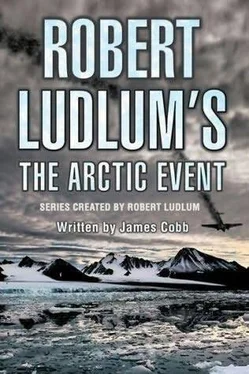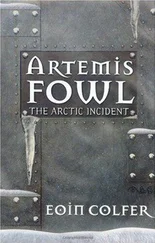Dressed casually in chino slacks, polo shirt, and golfing sweater, President Samuel Adams Castilla looked on as a Merlin helicopter in the dark-blue and gold livery of the presidential squadron sidled in over the helipad, its rotor wash stripping scarlet leaves from the treetops. Beyond the inevitable wary perimeter guard of Marine sentries and Secret Service agents, Castilla waited alone. There was no formal diplomatic greeting planned. No ruffles and flourishes. No onlooking members of the White House press corps.
Castilla’s guest had requested it.
That guest was now disembarking from the idling helicopter-a stocky, heavy-jowled man with short-trimmed gray hair and a blue pin-striped suit of European cut. It was worn as if it didn’t fit comfortably, as if the wearer was accustomed to a different kind of garb. The instinctive way he started to answer the salute of the Marine sentry at the foot of the helicopter’s stairway suggested what that other garb might be.
Castilla, a former governor of New Mexico and still tall, slim, and square-shouldered in his fifties, strode forward, his hand extended. “Welcome to Camp David, General,” he said over the idling whine of the Merlin’s turbines.
Dimetri Baranov, commanding general of the Thirty-seventh Strategic Air Force Army of the Russian Federation, returned a solid, dry-palmed handclasp. “It is an honor to be here, Mr. President. On behalf of my government, I thank you again for agreeing to meet with me under these…exceptional circumstances.”
“Not at all, General. Our nations share many mutual interests these days. Consultation between our governments is always welcome.”
Or at least necessary, Castilla added silently.
The new non-Soviet Russia provided the United States with almost as many challenges as had the old USSR, just in different ways. Corruption-racked, politically unstable, and with its economy still struggling back from the ruins of Communism, the fledgling Russian democracy was perpetually threatening either to backslide into totalitarianism or to collapse altogether. Neither outcome would be favorable for the United States, and Castilla had sworn neither would happen on his watch.
Over considerable resistance from some of the old-school Cold Warriors and congressional budget-cutters, Castilla had rammed a series of thinly disguised foreign aid bills through Congress, working with Federation President Potrenko to plug some of the more critical leaks in the Russian ship of state. Another such bill was undergoing debate at this time, with the issue still very much in doubt.
The last thing the Castilla administration needed was a new Russian complication. However, on the previous evening, a Russian diplomatic aircraft had touched down at Andrews Air Force Base. Baranov had been aboard, bearing a sealed letter from President Potrenko, naming the general as his personal representative and authorizing him to negotiate with President Castilla on “an urgent point of mutual national concern.”
Castilla feared this scenario could mean nothing but trouble. Baranov confirmed his fears.
“I regret the information I bear may not be so very welcome, Mr. President.” The general’s eyes flicked downward for a moment to the locked briefcase he carried.
“I see, General. If you would care to accompany me, at least we can be comfortable as we discuss it.”
The Secret Service teams unobtrusively shifted their observation positions as Castilla led his guest around the rock-lined fishpond to Aspen Lodge, the presidential residence at Camp David.
A few minutes later the two men were seated at an Adirondack-style table on the lodge’s broad porch, a quietly efficient navy steward serving hot tea, Russian style, in tall silver-filigreed glasses.
Baranov took a polite, disinterested sip. “I thank you for your hospitality, Mr. President.”
Castilla, who on a warm fall day probably would have preferred a cold Coors, nodded an acknowledgment. “I gather, General, this matter is rather time critical. How may we assist you and the Federation?”
Baranov removed a small key from the pocket of his vest. Placing the briefcase on the table, he unlocked the latches and removed a folder. Deliberately he laid a series of photographic prints on the tabletop. “I believe, Mr. President, that you might recognize these.”
Castilla took up one of the prints. Frowning, he adjusted his titanium-framed glasses and studied it.
It was a grainy black-and-white blowup from a video frame, showing a stark, ice-sheathed backdrop, possibly a glacier’s surface. The wreck of a large four-engined aircraft lay centered in the image, essentially intact but with one long, straight wing twisted and buckled back from the crash impact. Castilla was enough of an aviation expert to recognize the wreck as that of a Boeing B-29 heavy bomber, the same kind of aircraft that had been used to bombard Imperial Japan in the closing days of the Second World War and that had delivered the first nuclear weapons against Hiroshima and Nagasaki.
Or so it appeared to be.
“The mystery plane,” some media outlets were calling it. Others were referring to it as “the Polar Lady-Be-Good.” A scientific expedition on an isolated island in the Canadian Arctic had spotted the wreck on a mountain above their base, and these long-range telephoto images had been flashed around the world by the Internet and the global news networks.
It was the hot feature story of the day, and speculation about the aircraft and the aircrew that had flown it were rife.
“I recognize the picture,” Castilla said carefully. “But I am curious as to how this antique aircraft might be a matter of concern for our two nations.”
Castilla already knew that the mystery plane was a point of concern for the Russians. It had been mentioned in his recent national security briefings as a peculiar blip on the scope of the National Security Agency.
Over the past few days the Russian government had become frantic over the so-called mystery plane. NSA Internet monitors had noted a massive spike of activity on the part of certain known Russian Federation intelligence nodes, producing hundreds of hits on global info news sites covering the crash. Hundreds more hits were being generated on sites involving the multinational science expedition that had discovered the wreck, the historic tables of organization of the U.S. Air Force and its record of arctic operations.
Castilla would let the Russians provide their own explanation, although both he and his intelligence advisors had their suspicions.
The Russian kept his eyes fixed on the photographs covering the table. “Before I answer that, Mr. President, I must first ask you a question.”
Castilla took up his own filigreed glass. “Please feel free.”
Baranov tapped one of the photo prints. “What has the United States government learned about this airplane?”
“We have learned, rather remarkably, that this was not an American Superfortress,” Castilla replied, taking a drink of his tea. “The archives of both the U.S. Army Air Force and U.S. Air Force have been carefully examined. While we did lose a small number of B-29 aircraft and their B-50 derivative over the Arctic, all of those downed bombers have been located. In fact, all Boeing B-29s known to have served in the U.S. inventory have been accounted for.”
Castilla set his tea glass down. “Some eighty-seven Superfortresses were also provided to Great Britain in 1950. The Royal Air Force called them the Washington. The British Air Ministry has been consulted, and none of their Washingtons were ever lost or even flown over the Canadian Arctic, and all of the aircraft were eventually returned to the United States.”
Castilla looked levelly across the table. “Does that answer your question, General?”
Читать дальше












